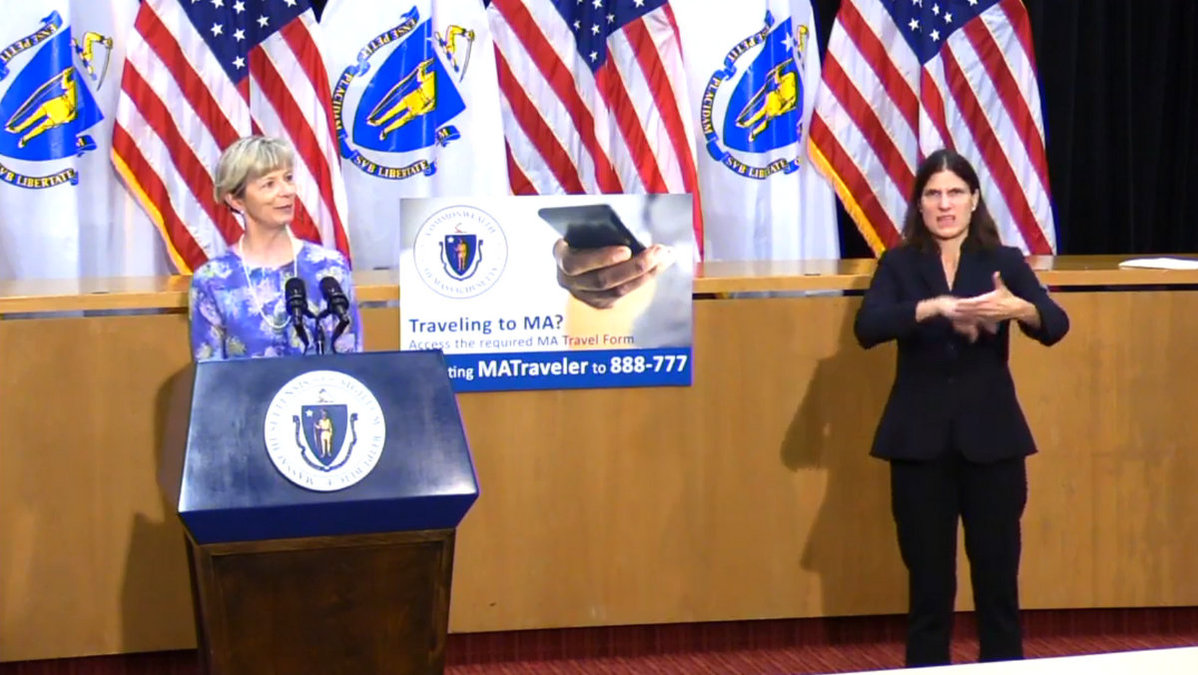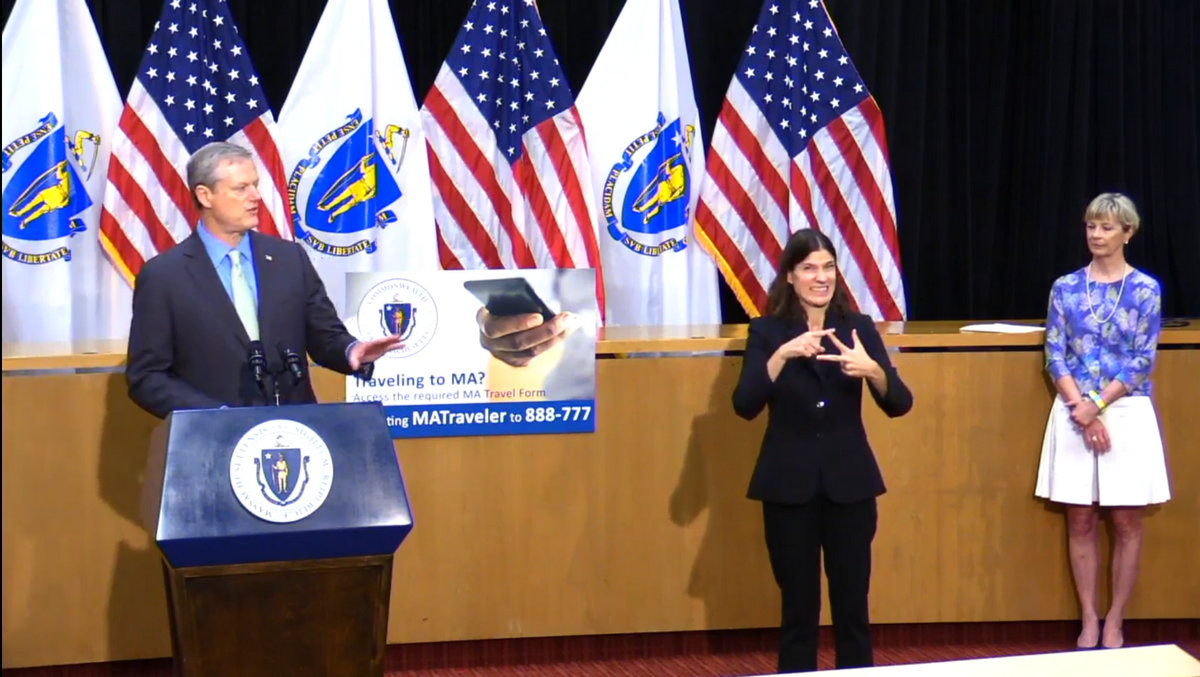State DPH Setting Up Rapid Response Testing Deployment for SchoolsBy Tammy Daniels, iBerkshires Staff
03:24PM / Thursday, August 20, 2020 | |
 Secretary of Health and Human Services Marylou Sudders explains the rapid response testing plans for schools on Thursday. Secretary of Health and Human Services Marylou Sudders explains the rapid response testing plans for schools on Thursday. |

Gov. Charlie Baker has been encouraging school systems to in low-transmission areas to start at least some in-person education.
BOSTON — The state is launching a rapid response testing program for all K-12 schools in Massachusetts as part of a package of resources to encourage schools to bring students back into the classrooms.
Gov. Charlie Baker on Thursday said the testing program for the novel coronavirus would be made available to the schools based on criteria spelled out by the Department of Public Health in coordination with local boards of health.
"This program will be designed to quickly deliver testing resources for students and school personnel, if there are multiple cases in a cohort that require a larger scale testing than a community may have access to currently," he said.
On Tuesday, the governor pointed out that more than 70 percent of the state's 371 public school districts were planning in person or some form of hybrid learning plan. At the same time, more than 300 of the state's cities and towns were reporting average daily COVID-19 case rates of less than four per 100,000 people, or less than five total over the past two weeks. These rates are published as categories on a new interactive map.
"Given the low transmission rates and the vast majority of our communities, we're glad that nearly three-quarters of our school districts are using the categories as they plan to either offer a full return of an in-person learning or hybrid approach to their kids," he said on Thursday.
The Berkshires falls in the lowest transmission rate category on the map, with only Pittsfield in the second-lowest category, but the school districts have varied in how to approach the coming school year.
The county's two largest communities — and only cities — are going remote to start. Both the North Adams and Pittsfield public schools will begin the year on Sept. 15 with remote learning in all grades with the expectation that they will transition into a hybrid model sometime in the fall.
• Hoosac Valley Regional School District in Adams and Cheshire will also begin remote on Sept. 15.
• McCann Technical School in North Adams will resume Sept. 16 with a hybrid model to accommodate shops.
• Mount Greylock Regional School District will open Sept. 16 with in-person learning at Lanesborough and Williamstown elementaries four days a week (Wednesdays remote) and Grades 7-12 two days in class and three remote, with the transition to four days on Oct. 1.
• Berkshire Hills Regional will begin Sept. 14 with all grades remotely.
• Central Berkshire Regional will begin remotely Sept. 15 and reassess on Oct. 1.
• Southern Berkshire Regional submitted plans for three options but is scheduled to vote on Thursday as to how it will start the year.
• Most smaller schools are beginning with in-person learning, including Gabriel Abbott in Florida, Emma Miller in Savoy, Rowe Elementary (all on Sept. 8) and Hancock Elementary (Sept. 9); Clarksburg School will begin Sept. 14 with K-5 in class and 6-8 remote, with an assessment in three weeks. Richmond Consolidated with start remotely on Sept. 14.
All of the school districts have plans in place to switch between remote, full and hybrid models during the school year.
Secretary of Health and Human Services Marylou Sudders said the state's testing capacity has risen since May and that more than two-thirds of tests have a turnaround of less than six days.
"As the governor mentioned to build on this progress to expand access to testing, we're adding the rapid response testing programs for schools as additional support," she said. "School officials should always consult with your local public health authorities to determine if requesting a state-sponsored rapid mobile testing unit to test to ensure staff is warranted."
The mobile response team would be deployed when specific criteria is met, including if two or more staff or students in a classroom, three individuals in a cohort or grade, three or more of staff at the same school, or more than 3 percent of a school develops COVID-19 within 14 days.
The testing response would be focused on K-12 schools since colleges and universities have their own health services and have made their own plans. The request for testing would come from the local boards of health and the school districts, with parental permission for testing.
"We see it as an abundance of caution of being able to do, just like we do now, we have stopped the spread in 20 communities, where anyone who wants who is asymptomatic can be tested," Sudders said. "The [U.S. Centers for Disease Control] does not recommend testing for students and staff. So we see this as a response to school concern that they might have a development in the school, and then a cohort in the classroom, among teachers or a couple of kids on the bus. So we see this as a way to deploy just like we did in nursing homes."
The state can't come out for "everybody who has a runny nose" so there will be parameters and guidance will be coming out for schools and boards of health. Sudders also said the state is increasing lab capacity through an open procurement process that includes several proposals from Western Massachusetts.
"I respect and understand the importance of making sure that this be done safely," said the governor, in response to about Amherst, where teachers have been protesting reopening plans. "But I would also ask people to respect the science, which at this point is developing a fairly decent body of evidence, with respect to what works and what does it when it comes to teaching in person."
Some special education schools have been operating for months in person, he said.
The DPH also issued regulations on Wednesday requiring public school students to have a flu vaccination before beginning classes in January 2021 to reduce pressure on the health care system and prevent the spread of influenza, which has many of the same symptoms of COVID-19. Massachusetts averages around 40,000 cases of flu with 55,000 emergency room visits and 8,000 hospitalizations a year.
"COVID-19 will be a part of our lives until there is a vaccine, or medical breakthrough as the governor stated, so we must continue to take all necessary steps to protect teachers, students, and staff," said Lt. Gov. Karyn Polito on Thursday. "It's imperative that we get students back into the classrooms and this vaccine requirement will provide an additional necessary layer of protection for all students returning this year.
"Many flu symptoms are very similar to those of COVID-19. Given the vigilance everyone is and will be practicing for COVID-19 symptoms, every case of the flu we can prevent helps avoid unnecessary disruptions and learning environments."
The vaccination will be required of children ages 6 months and older who will be attending any in-class instruction or day care or, in the case of college students, using any campus facilities even if taking classes a remotely. Children being home-schooled or who have religious exemptions or medical issues will not have to be vaccinated.
"Governor Baker, Secretary [of Health and Human Services Marylou] Sudders and I know that we have asked a lot of everyone these months," the lieutenant governor said. "But everyone's work is indeed paying off. Everyone must do their part, but it's critical that we continue to follow the data set our standards and the best possible science and help everyone follow the public health guidance to combat COVID-19."
Sudders also said that the DPH portal for testing data will be migrating from a server to Amazon cloud computing services on Friday. This long-planned upgrade will strengthen the system, she said, will affect the results for testing numbers over the weekend and there will be no dashboard on Sunday. All lab results will be on the Monday dashboard. The weekly public health dashboard's deadline will also be shifted to 6 p.m. on Wednesday to accommodate the amount of data being compiled.
| 
 MEMBER SIGN IN
MEMBER SIGN IN
 MEMBER SIGN IN
MEMBER SIGN IN